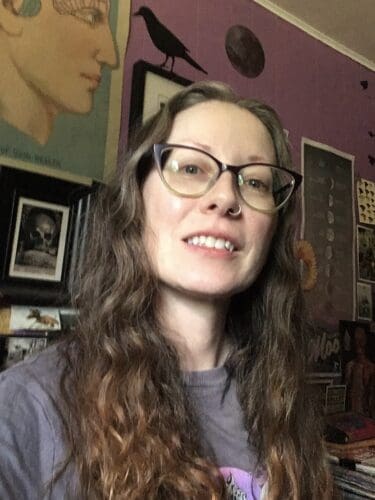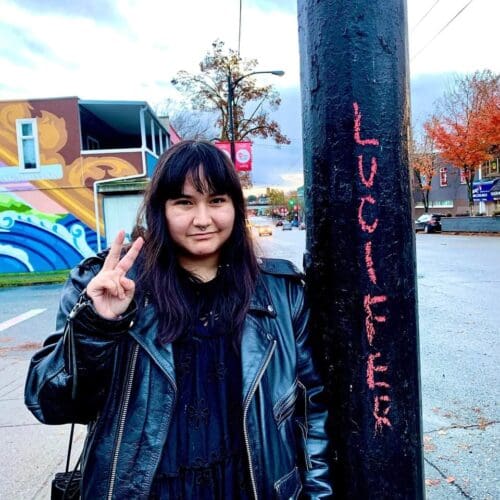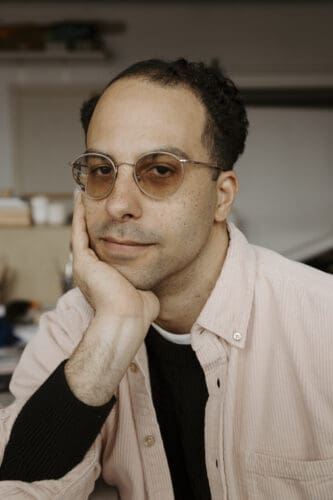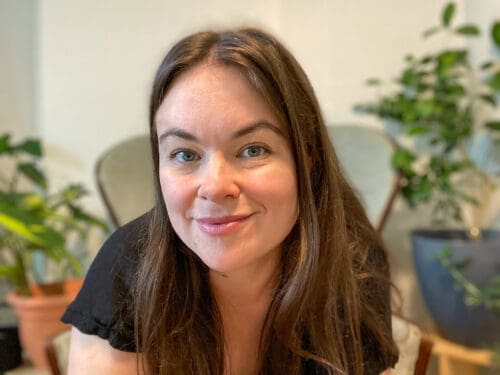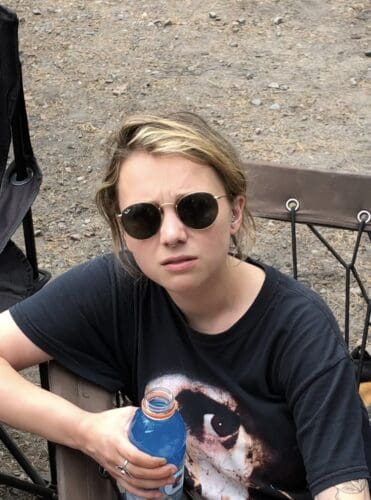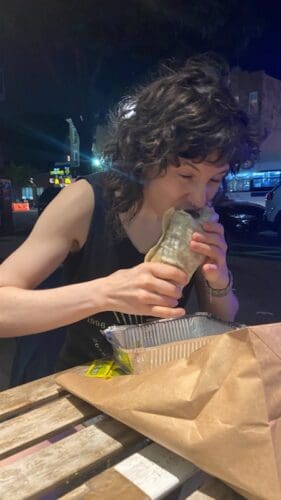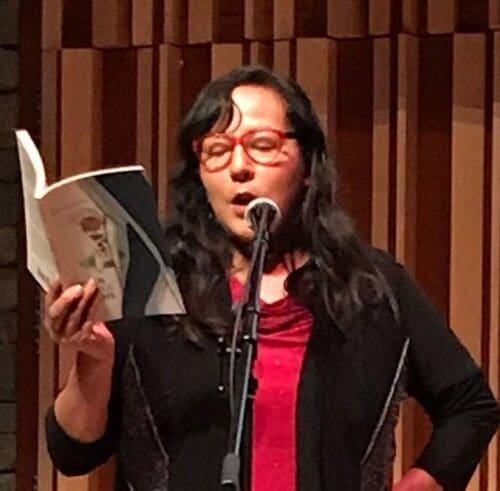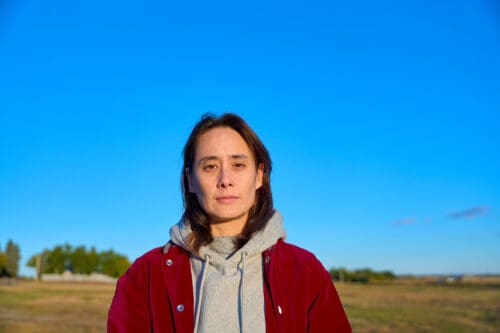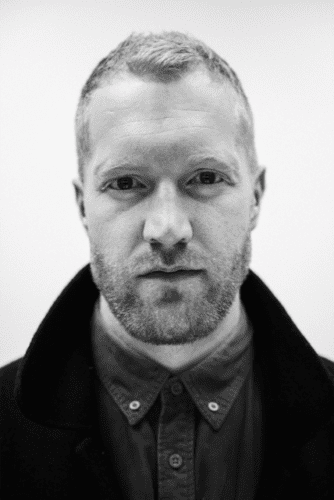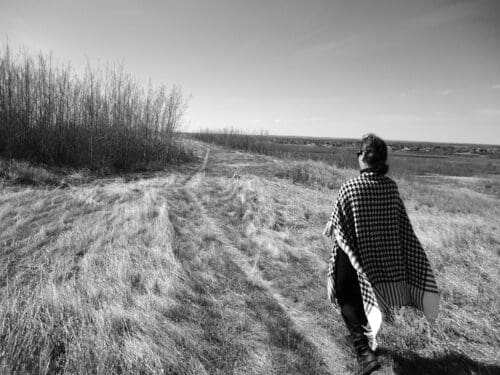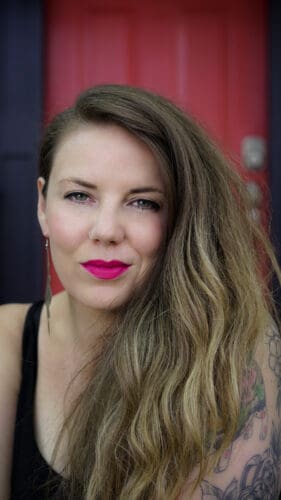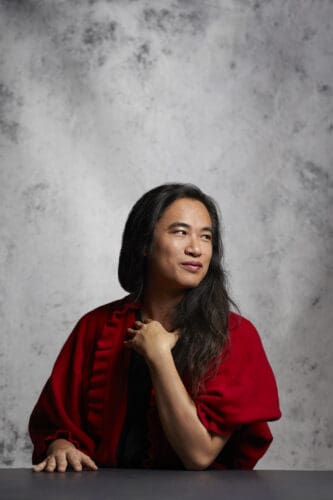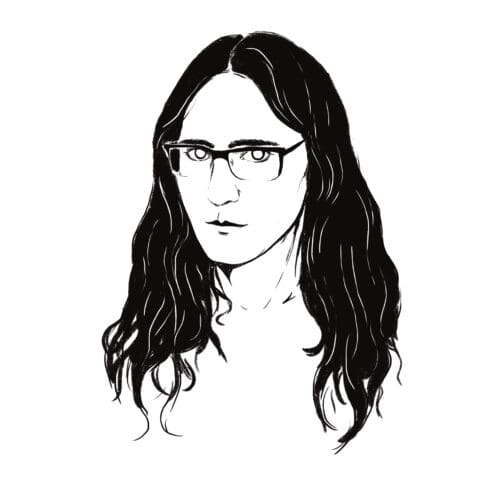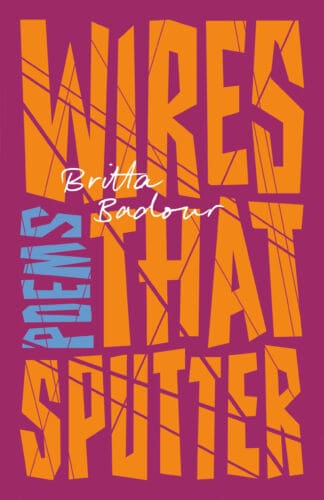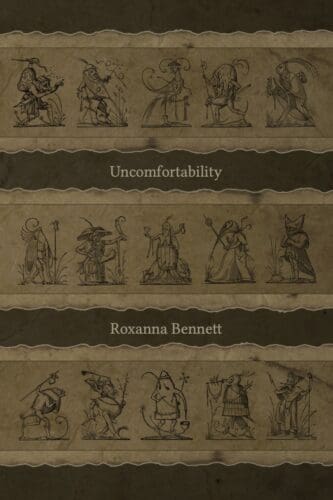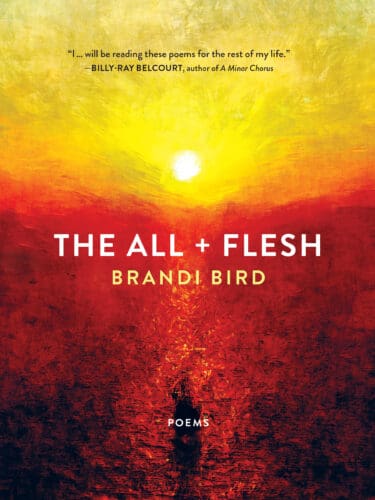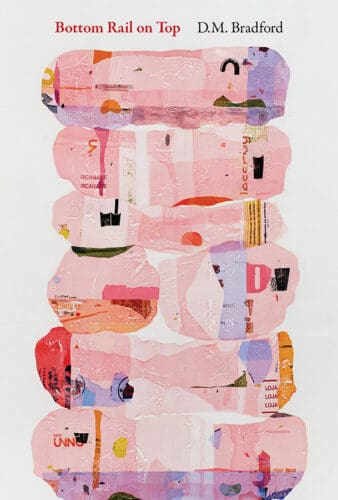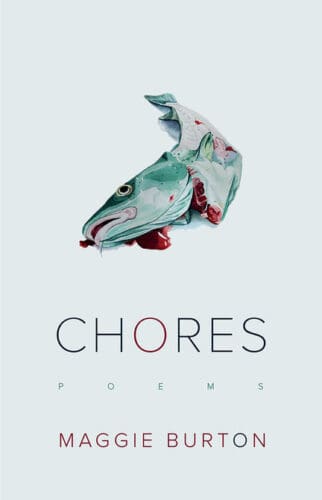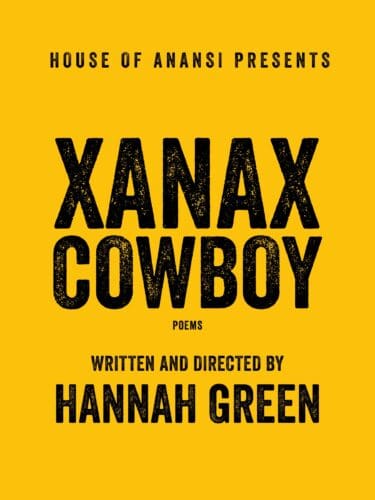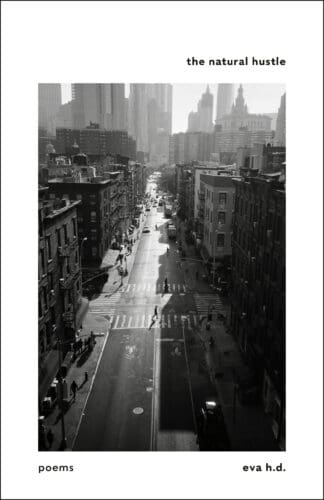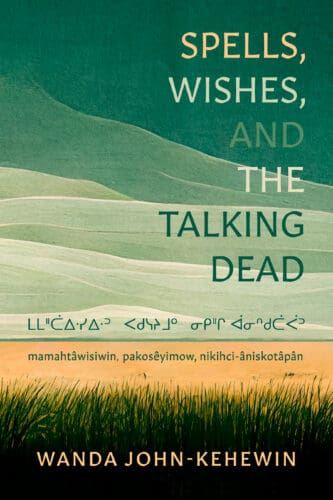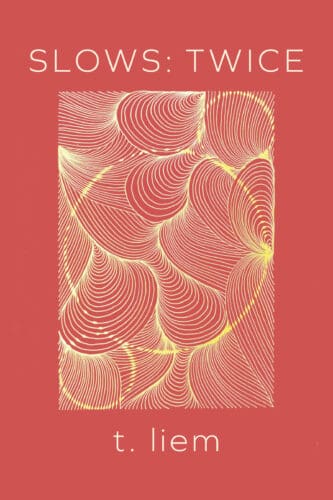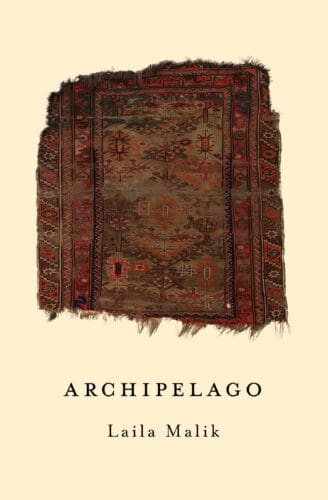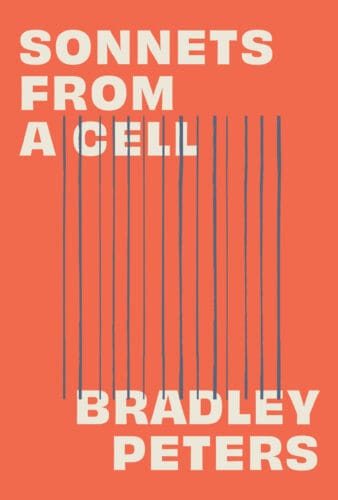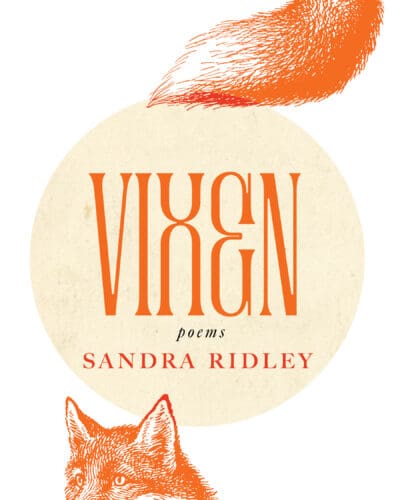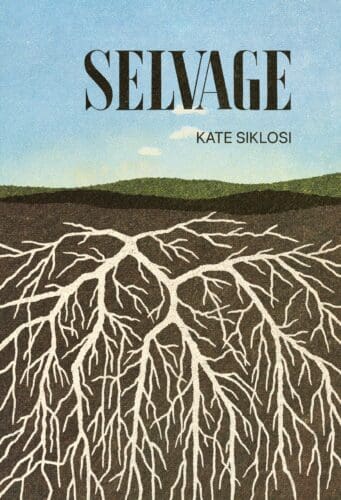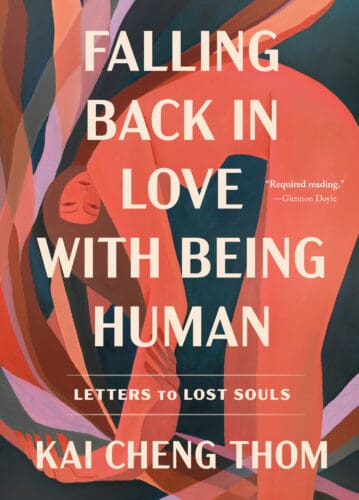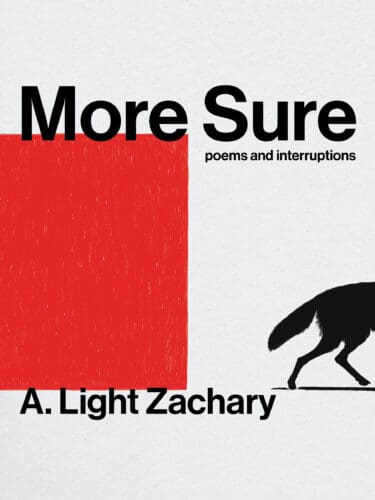NPM24: Meet the shortlists
Celebrating 15 shortlisted poets
On Wednesday, April 17, 2024, the League announced the shortlists of our three annual book prizes: the Gerald Lampert Memorial Award for debut books, the Pat Lowther Memorial Award for books by women, and the Raymond Souster Award for books by League members. A total of 15 incredible poets are showcased on these three lists, and we were excited to learn a little bit more about these poets, their books, and the kind of weather than inspires them.
Join us for an online celebration of our shortlists on Tuesday, April 30, 2024 at 8pm ET! The evening will feature brief readings from our shortlisted poets. Winners will be announced on Wednesday, May 1, 2024 at 10am ET.
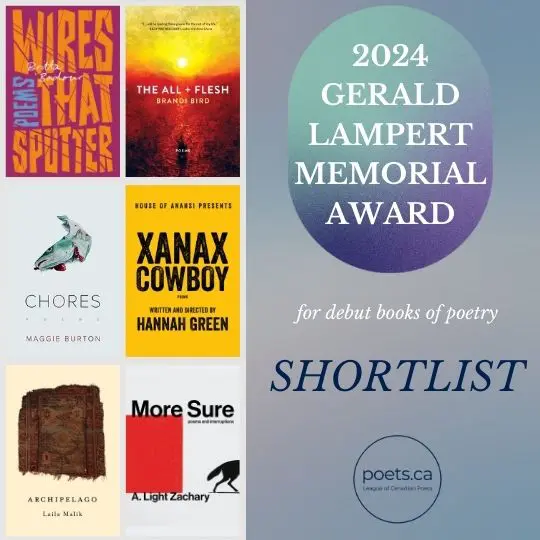
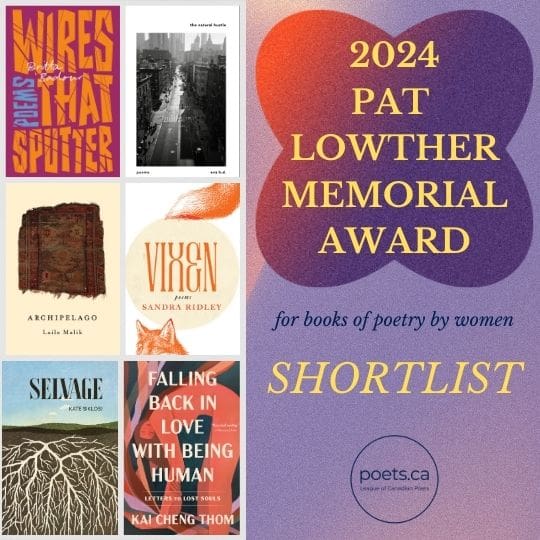
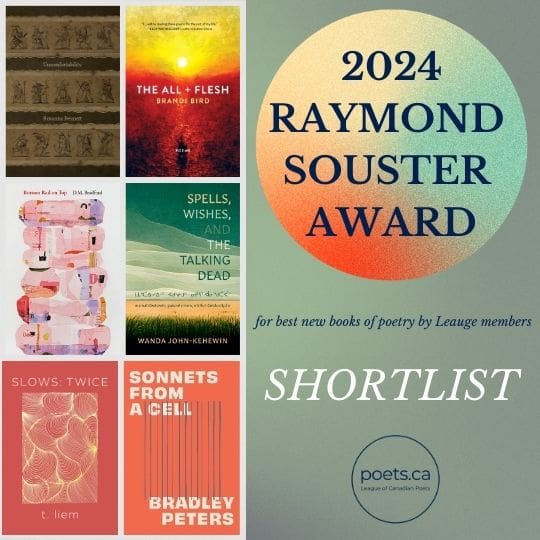
Writers recommend
We asked our shortlisted poets to recommend a book they think you'll enjoy if you love their book. Happy reading!
If you loved...
Wires that Sputter by Britta Badour
The All + Flesh by Brandi Bird
Bottom Rail on Top by D.M. Bradford
Chores by Maggie Burton
Xanax Cowboy by Hannah Green
The Natural Hustle by Eva H.D.
Spells, Wishes, and the Talking Dead: ᒪᒪᐦᑖᐃᐧᓯᐃᐧᐣ ᐸᑯᓭᔨᒧᐤ ᓂᑭᐦᒋ ᐋᓂᐢᑯᑖᐹᐣ mamahtâwisiwin, pakosêyimow, nikihci-âniskotâpân by Wanda John-Kehewin
...try reading:
Underrated Royalty by Shahaddah Jack
Undoing Hours by Selina Boan
A Is for Acholi by Otoniya J. Okot Bitek
Safety Razor by Emily Osborne
Need Machine by Andrew Faulkner
Living in Paradise by Giorgio Di Cicco
Cut to Fortress by Tawahum Bige
Slows: Twice by T. Liem
archipelago by Laila Malik
Sonnets from a Cell by Bradley Peters
Good Want by Domenica Martinello
My Grief, the Sun by Sanna Wani
Test Piece by Sheryda Warrener, or Strangers by Rob Taylor
Vixen by Sandra Ridley
But the sun, and the ships, and the fish, and the waves by Conyer Clayton
Selvage by Kate Siklosi
sulphurtongue by Rebecca Salazar, OO: Typewriter Poems by Dani Spinosa, or Magyarazni by Helen Hajnoczky
Falling Back in Love with Being Human by Kai Cheng Thom
More Sure by A. Light Zachary
Where the Words End and My Body Begins by Amber Dawn
Stedfast by Ali Blythe
Our National Poetry Month theme this year is "weather" — what kind of weather makes a perfect writing day for you?
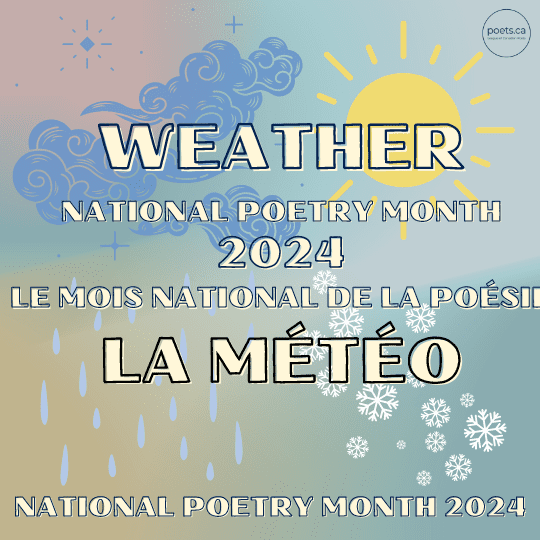
Badour: I love writing any time of night when the rain has lifted and there is a bit of fog left swirling under the street lamps.
John-Kehewin: A rainy day with my blinds drawn, a hot cup of tea , a clean desk and my animals.
Ridley: Windswept and stormy and Eeyore-grey.
Siklosi: I love a grey, rainy writing day. My desk is at the top of the house under the roof, and the pitter patter of rain sprinkling down is the perfect soundscape to get lost in while I'm working.
Thom: Rain! I'm a Vancouver girl at heart.

Burton: Rain, drizzle, and fog.
Malik: Overcast days when the lake roils and the air is thick with moisture. Those days feel charged with prehistoric energy and rife with creation.
H.D.: Weather that pays my rent.
Bennett: as the Tao says "the Way is not hard for those who have no preferences"
Liem: I'm not sure! But I appreciate a day with many weathers, where it starts one way and ends another.
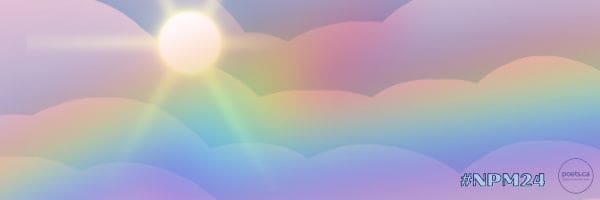
Bird: I love when it's -45 degrees outside and everything is crisp and clean. I submitted my final edits for The All + Flesh in Winnipeg over Christmas of 2022. It was absolutely frigid outside and the weather just felt right.
Peters: I like writing in the morning, and I find colder weather helps get the creative juices flowing, so maybe a dark winter morning with a cup of tea.
Bradford: A heavy snow day!
Green: I like summer mornings when it is going to be a hot & hazy day
Zachary: Summer, sun, sea-wind.
What does it mean to you for your book to be shortlisted for our awards?
Bradford: As the institutional supports for what we do as artists and poets are faltering, the recognition of my peers and colleagues that the Raymond Souster Award represents feels like the whole thing. I'm honoured to be a finalist alongside an incredible group of poets, and I can't wait to take a moment to celebrate what we're up to, what we're about, as a community.
Green: It is so exciting!!
Liem: A career in writing always feels precarious and though awards and lists are not the point, it is an honour to be included and supported in this way. Not to be dramatic, but I never feel certain that I will be able to continue writing and publishing so I'm grateful to the League for making this space to celebrate and for highlighting the work that's been done. Big congratulations to all the finalists!
Thom: To be a finalist for a major Canadian literary award in poetry is, for me, the realization of multiple dreams: My personal dream, certainly, to be recognized as a literary artist in this country, but also that of my Chinese family who emigrated here in the early half of the 20th century at a time when Chinese migrants were heavily impacted by the Head Tax and Chinese Exclusion Act. They suffered and survived for the dream of a bright future for their descendants. I hope that my work and life can honour them, as well as the many trans women of colour who died before me in the struggle to have trans voices heard within the dominant culture.
H.D.: I failed out of school, so I'm hoping that being a finalist for this award comes with a diploma. My career will never be the same again.
Badour: For me, it was a huge accomplishment to realize my dream of being a published poet and to have this book take shape in the world. Being recognized as a finalist means my work has an even greater opportunity to reach wider audiences and be put in the hands of readers who might not have otherwise been introduced to my poetry. Gratitude to the selection committee for amplifying Wires that Sputter!
Bird: Being a finalist means that more people may pick up my book and get inspired to write themselves! That would be the best compliment.
John-Kehewin: Being a finalist means that I am reaching others in a good kind way with my words, thoughts and experiences. It means that future generations will have Indigenous writers to turn to for inspiration. It also means the Indigenous experience lives on in history and doesn't just become the past. It means my words have fell on ears who are listening with open minds and hearts.
Burton: My hope is that being a finalist for the Gerald Lampert Award brings Chores and other poetry collections published by Breakwater Books here in Newfoundland and Labrador to new audiences across Canada.
Zachary: This is my favourite book. I am grateful and gratified to know it is being read with care and attention.
Malik: I know enough to know that the quiet aunties and children who make your food and fade into the background are the most furious of secret poets, that the best is hidden deep within the mundane, may never be known to a world that strains and churns. And yet, as a person who never had the opportunity to exclusively devote my time to writing, being named a finalist is a nod to the quiet aunty and child in me, the one who has stubbornly continued to write against all the chafe and vagary and unlikeliness. It means the opportunity to connect with and learn from those who also insist on summoning spirit through their wordwork, and the opportunity to offer others a clear window of possibility that may otherwise have seemed unimaginable.
Ridley: Given Pat Lowther's life and work, and the full context of this award, there is no higher honour for Vixen. I am deeply grateful.
Peters: Never in my wildest dreams would I have anticipated such an incredible honour. My biggest hope is that being a finalist for this award will help illuminate the systemic issues within our countries inherently violent penal system. I am floored and full of gratitude.
Siklosi: It's an incredible honour to be a finalist, especially for this prize in particular that celebrates and recognizes the work of women in Canada. My work involves a lot of domestic, handcrafted visual work, which for too long was not seen as serious work, so it is wonderful to have some recognition that this work has a definite place. Also, this book in particular took me many years to write, and was a difficult, trying process as it deals with some really sensitive familial trauma; so to have this book connect with others and ignite further conversations is really energizing.
Bennett: we consider poem-making a calling, not a career


